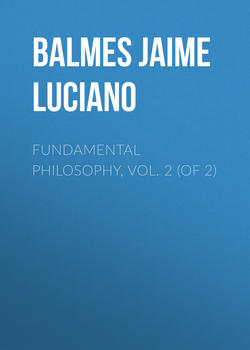Читать книгу Fundamental Philosophy, Vol. 2 (of 2) - Balmes Jaime Luciano - Страница 15
BOOK FOURTH.
ON IDEAS
CHAPTER XV.
ILLUSTRATIONS OF THE VALUE OF GENERAL CONCEPTIONS
Оглавление96. However vague the ideas an isolated being would form of objects distinct from itself, they will never be so vague as not to refer to a real thing. The mind may not know the nature of this reality, but it knows for certain that it exists. A man blind from his birth can form no clear idea of colors, nor of the sensation of seeing; but is he therefore ignorant that sensation exists, and that the words, color, seeing, and others which refer to sight, have a positive and determinate object? Certainly not. The blind man does not know in what these things, of which he hears, consist, but he knows that they are something; those of his conceptions that refer to them may be called imperfect, but they are not vain; the words by which he expresses them, have for him a positive, although incomplete meaning.
97. There is a great difference between incomplete and indeterminate conceptions; the former may refer to a positive thing, although imperfectly known; the latter include nothing but a relation of ideas, meaning nothing in the order of facts. We will render this difference more apparent by explaining the example of the preceding paragraph.
A man blind from his birth has no intuition of colors, nor of any thing that refers to the sense of sight; but he is sure that there exist external facts which correspond to an internal affection called seeing. This idea is incomplete, but it has a determinate object. The words of those who possess the sense of sight reveal to him its existence; he knows not, what it is, but, that it is; in other words, he does not know its essence, but its existence. Let us now suppose the possibility of an order of sensations different from ours, and in nowise resembling those which we experience, to be called in question. The conception referred to the new sensations would not only be incomplete, but would have no relation to any real object. The general idea, then, of affection of a sensitive being, will be all that our mind will have; but it will know nothing of its existence, and can form only mere conjectures as to the conditions of its possibility. This example illustrates our idea. We find in the man blind from his birth, who hears of what pertains to the sense of sight, an incomplete conception, but one to which the existence of a series of facts, known to his mind, corresponds. But in ourselves, if we reflect upon a kind of sensations different from our own, we find conceptions, having, indeed, a general object, but of whose realization we know nothing.
98. Thus is it explained how our mind, without having intuition of a thing, can, nevertheless, know it, and be perfectly certain of its existence. We have here demonstrated that conceptions may, although they do not refer to a sensible intuition, have a value, not only in the order of ideas, but also in that of facts.
99. In order to prove the sterility of all conception beyond sensible intuition, Kant adduces one reason, which is, that we cannot define the categories and the principles which flow from them without referring to the objects of sensibility. This is no proof at all; for, in the first place, the impossibility of a definition does not always arise from the fact that the conception to be defined is empty; but it very frequently results from the conception being simple, and consequently not susceptible of a division into parts that may be expressed by words. How will he define the idea of being? No matter how he attempts to define it, the thing to be defined will enter into the definition: the words, thing, reality, existence, all signify being.
It is very natural, since sensible intuition is the basis of our relations with the external world, and consequently with our fellow-men, that when we purpose to express any relation whatever, we should call to our aid sensible applications; but we are not thence to infer that there is not in our mind, independently of them, a real truth contained in the conception which we wish to explain.
100. This capacity of knowing objects under general ideas, is a characteristic property of our mind, and we cannot, in our inability to penetrate to the essence of things, think without this indispensable auxiliary. In the ordinary course of human affairs, it often happens that we need to know the existence of a thing and of some of its attributes, but do not require a perfect knowledge of it. In such cases, general ideas, aided by some data of experience, put us in mediate communication with the object not presented to our intuition. But why cannot the same thing be verified with respect to non-sensible beings, which alone are the object of intellectual intuitions? I know not what exception can be taken to these observations, founded as they are upon observation of internal phenomena, and confirmed by common sense.
